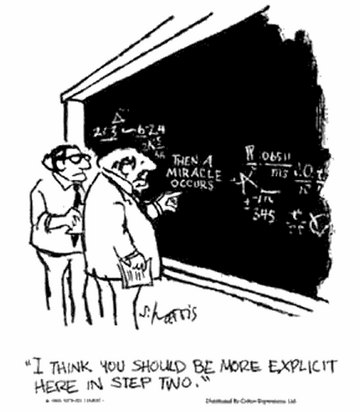Randall
J. Randall Murphy
The analysis for this begins with the description of the hard problem in the Wikipedia article, so let's stick with that for the moment, to quote:If you see what I'm saying then you understand that it's the arbitrary rejection of answers to the hard problem as built into it's formulation that makes it incoherent. It's basically saying that the hard problem cannot be solved because if it is solved the answer must be wrong because the hard problem cannot be solved.
I just don't see that circular reasoning at all in Nagel's paper - I think that would be made pretty short work of in academic circles - Nagel seems very clearly to lay out the hard problem and discusses the gap between the objective and the subjective and why reductionist approaches haven't worked. I don't see where the idea of a consciousness field bridges that gap specifically accounts for what it is like to be something. Your theory would need to be able to successfully predict what it is like to be a bat.
"Chalmers claims that the problem of experience is distinct from this set ( the modern materialistic conception of natural phenomena ), and he argues that the problem of experience will persist even when the performance of all the relevant functions is explained."
The circular argument is that if all the relevant functions of subjective experience ( consciousness ) are explained then there is no reason to think that it ( consciousness ) hasn't been explained. However Chalmers simply denies this by invoking this so-called "hard problem" that he maintains will persist regardless of whether modern materialistic conception of natural phenomena explains consciousness. This problem isn't as obvious in Nagel's paper because he starts off assuming that the hard problem is relevant in the first place. Specifically he assumes that explaining how subjective experience ( consciousness ) arises ( how a bat works ) cannot adequately explain what subjective experience ( consciousness ) itself is like ( what it's like to be a bat ) and the inference is that therefore, we have not explained what consciousness is ( our original question ).
The counterpoint to this is that Chalmer's position as explained by Nagel isn't relevant to the question because it's based on a logical incoherency brought about by the language in the formulation. Specifically, explaining what something "is" doesn't require that we explain what it's "like". It only requires that we explain what it "is". What something "is" and what something is "like" are two separate questions. A full explanation gets into the details of gramatical transitivity. I'll leave you to explore that link in further detail at your leisure and attempt to illustrate it again below in simpler terms:
- Question Q : Asks, What is X?
- Answer A: Explains what X is.
- Answer B: Explains that answer A does not explain what it's like to be X.
- Because Answer B addresses Answer A instead of answering Question Q, Answer B is not a relevant to Question Q. It's relevant only to another question that has not been asked ( What is it like to be X? ).
In the koan analysis, I didn't simply make up some "personal" interpretation without any supportable relevance to the content, therefore my "point of view" is both supportable and relevant. Saying I don't understand it and providing no other reasoning is pure denial. As for understanding the so-called "hard problem", there's more than one facet to the problem, but with respect to Nagel's paper, it's perfectly obvious that we cannot know what it's like to be X unless we are X, and that brings the whole concept of the nature of being into the mix. So I understand it just fine. I'm just on the side of the equation with those who think that this particular facet of the hard problem doesn't apply to the question we're asking ( What is consciousness? ).I do think your interpretation of the Koan in the discussion above and specifically your belief that you have "shredded" it (which, from your point of view, you surely have) ties in with what appears to me to be your inability to understand the hard problem. Yes, I do think I could quote Nagel in specific objection but I think you would just respond with reiteration.
I don't see any need to ask for Nagel's help here, and assuming that those in academic circles would make "short work" of my reasoning is a faith based assumption. If I'm wrong, then among other things, there should be some explanation that provides a rationale for thinking that the question of what consciousness is, is the same question as asking what it's like. I've seen no such explanation and can see no rationale for thinking it's a valid position to take.As I truly think I could be missing the point of all this - I think you should contact Nagel directly with an abstract, there's an e-mail at the link below:
Thomas Nagel, Faculty of Philosophy | NYU
or a relevant department or association of philosophy for a review. If you do, I would like to know the response.
Or again, if someone is reading this thread and can help us out - that would be great!
Last edited:


 .
. .
.
 .
.